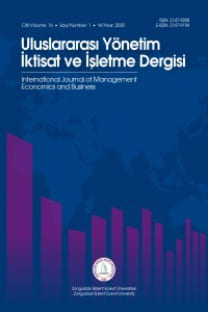RELATION OF 3PL AND 4PL ACTIVIES AND THEIR EFFECT ON EMERGING ECONOMIES
There are constant developments in logistics chains around the World. For a competitive advantage over their rivals, businesses need to utilize their core competencies and start to outsource to lower costs, provide higher quality and efficient timing to meet their customers’ needs. Therefore the principle of third and fourth party logistics have been introduced. These systems have great impact on economies especially to emerging ones. Using a literture review methodology, the aim of this study is to show the relationship between the concepts of 3PL and 4PL, explain how these concepts altogether effect the business environment in emerging economies.
RELATION OF 3PL AND 4PL ACTIVIES AND THEIR EFFECT ON EMERGING ECONOMIES
There are constant developments in logistics chains around the World. For a competitive advantage over their rivals, businesses need to utilize their core competencies and start to outsource to lower costs, provide higher quality and efficient timing to meet their customers’ needs. Therefore the principle of third and fourth party logistics have been introduced. These systems have great impact on economies especially to emerging ones. Using a literture review methodology, the aim of this study is to show the relationship between the concepts of 3PL and 4PL, explain how these concepts altogether effect the business environment in emerging economies
___
- Anu H. Bask. (2001). Relationships among TPL providers and members of supply chains – a strategic perspective. Journal of Business & Industrial Marketing, Vol. 16 Iss 6 pp. 470 – 486.
- Bourlakis, C. and Bourlakis. M. (2005). Information technology safeguards, logistics asset specificity and 4th party logistics network creation in the food retail chain. Journal of Business and Industrial Marketing, Vol. 20, No. 2/3, pp. 88-98.
- Carmel, E., & Agarwal, R. (2006). The maturation of offshore sourcing of information technology work. In Information systems outsourcing, Springer Berlin Heidelberg. pp. 631-650.
- Donada, C. Nogatchewsky, G. (2009). Emotions in outsourcing. an empirical study in the hotel industry. International Journal of Hospitality Management, 28, (2009), 367- 373.
- Hanson G. H. (2012). The rise of middle kingdoms: emerging economies in global trade. National Bureau Of Economıc Research, Nber Working Paper No. 17961, Jel No. F10 pp.1-35.
- Hong, J., Chin, Anthony T.H., Liu, B. (2004). Logistics outsourcing by manufacturers in china: a survey of the industry. Transportation Journal, Vol.18, pp.17-25.
- Hoskisson, R. E., Eden, L., Lau, C. M., & Wright, M. (2000). Strategy in emerging economies. Academy of Management Journal, 43(3), 249-267.
- Hosie, P. and Egan, Victor & Li, Y. (2007). Drivers of fifth party logistics (5pl) service providers for supply chain management. Journal Of Business Logistics, Vol 11, No.Z 1990 27 pp.27-39.
- Hofer, A. R., Knemeyer, A. M, Dresner, M.E. (2009). Antecedents and dimensions df customer partnering behavior in logistics outsourcing relationships. Journal of Business Logistics, Vol. 30, No. 2, pp.141-159.
- John T. Mentzer S. L. Michelle B., (2004). Toward a unified theory of logistics, International Journal of Physical Distribution & Logistics Management, Vol. 34 Iss 8 pp. 606 – 627.
- Kakabadse A. , Kakabadse N. (2002). Trends in outsourcing: contrasting USA and Europe, European Management Journal, Vol. 20, No. 2, pp. 189–198, April.
- Leeman, D., & Reynolds, D. (2012). Trust and outsourcing: do perceptions of trust influence the retention of outsourcing providers in the hospitality industry?. International Journal of Hospitality Management, 31(2), pp.601-608.
- Lieb, R. and Randall, H. (1996) A comparison of the use of third party logistics services by large American manfacturers, 1991, 1994, and 1996. Journal of Business Logistics, No:1 pp. 17.
- Meyer KE, Peng MW, Estirn, S. &Bhaumik, S.K.. (2009). Institutions, Resources and entry strategıes in emerging economies, Strategic Management Journal Strat. Mgmt. J., 30: 61–80.
- Nelson, J.M., Tilley, C., and Walker, L. (Eds.). 1998. Transforming post-communist political economies; Task force on economies in transition, National Research Council. Washington, DC: National Academy Press.
- Pokharel S., Mutha A. 2009. Perspectives in reverse logistics: a review. Resources, Conservation and Recycling,Vol. 53, No. 4, pp. 175-182.
- Rajshekhar (Raj) G. Javalgi , Ashutosh Dixit, Robert F. Scherer, (2009). Outsourcing to emerging markets: Theoretical perspectives and policy implications, Journal of International Management No: 15, pp. 156–168.
- Sbeffi, Y. (1990). Third party logistics: Present and future prospects. Journal of Business Logistics, VoL 11, No.Z 1990 27 pp.27-39
- Yeung J., Hoi Y., Willem S., Chee-Chuong S., Baofeng H.(2006). International Journal of Physical Distribution & Logistics Management, Vol. 36 No. 3, 2 pp. 210-230.
- Wagner, M., Sutter, R..(2012). A qualitative investigation of innovation between third- party logistics providers and customers. Int. J. Production Economics 140, pp. 944–958.
- Vasiliauskas A., Jakubauskas. G.(2007). Principle and benefits of third party logistics approach when managing logistics supply chain, Transport, Vol XXII, No 2, 68– 72.
- Zacharia, Z., Nada R. Sanders1 A.,& Nancy W. N.(2011). The Emerging role of the third- party logistics provider (3PL) asan orchestrator, Journal of Business Logistics, 32(1): 40–54.
- http://lojistikmakaleleri.blogspot.com.tr/2014/03/3pl-ucuncu-parti-lojistik-nedir.html Erişim tarihi: 09.03.2016.
- ISSN: 2147-9208
- Başlangıç: 2005
- Yayıncı: Zonguldak Bülent Ecevit Üniversitesi
Sayıdaki Diğer Makaleler
FİNANSAL OKURYAZARLIK ARAŞTIRMASI: ERCİYES ÜNİVERSİTESİ ÖĞRENCİLERİ ÜZERİNDE BİR UYGULAMA
Famil ŞAMİLOĞLU, Yunus Emre KAHRAMAN, Haşim BAĞCI
BORSADA İŞLEM YAPMAK MI? YOKSA BORSADA OYNAMAK MI? BEKLENEN DEĞER TEORİSİ
Murat ATİK, Bülent YILMAZ, Yaşar KÖSE
Ramazan TERZİ, Metin ATMACA, Serkan TERZİ
YENİ BİR İŞ MODELİ: MUHASEBE ALANINDA BULUT BİLİŞİM
Alper AYTEKİN, Yıldıray ERDOĞAN, Kübra KAVALCI
Hasan AYAYDIN, İbrahim KARAASLAN
İbrahim Ethem DAĞDEVİREN, Şakir MİRZA, Fatıma DAĞDEVİREN
ULUSLARARASI FİNANSAL RAPORLAMA STANDARTLARININ KAPSAMI: SEÇİLMİŞ 7 SEKTÖR BAZINDA İNCELEME
